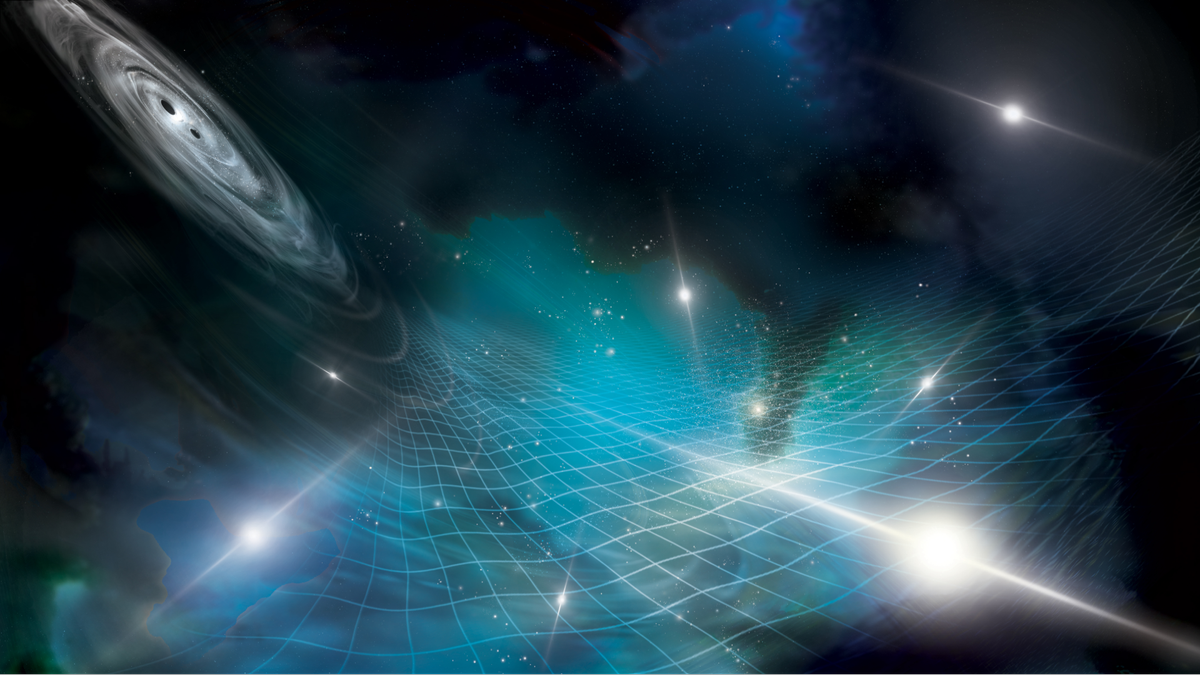Science
Related: About this forumThe gravitational wave background of the universe has been heard for the 1st time
By Sharmila Kuthunur published about 2 hours ago
In a historic first, astronomers have detected low-frequency gravitational waves using a galaxy-sized antenna of millisecond pulsars in the Milky Way.

bright points of light spread out throughout space emit a grid-like pattern
Artist's interpretation of an array of pulsars being affected by gravitational ripples produced by a supermassive black hole binary in a distant galaxy. (Image credit: Aurore Simonnet for the NANOGrav Collaboration)
Astronomers have heard the faint hum of gravitational waves echoing throughout the universe for the first time.
For nearly a decade, scientists have been hunting for the gravitational wave background, a faint but persistent echo of gravitational waves thought to have been set off by events that took place soon after the Big Bang and the mergers of supermassive black holes throughout the cosmos. While such a background was long theorized by physicists and sought by astronomers, signals of gravitational waves that make up that background have been hard to detect due to being faint, in addition to vibrating at decade-long timescales. Now, long-term observations have finally confirmed their presence.
In a highly anticipated and globally coordinated announcement on Wednesday (June 28), teams of scientists worldwide have reported the discovery of the "low pitch hum" of these cosmic ripples flowing through the Milky Way.
While astronomers don't definitively know what's causing the hum, the detected signal is "compelling evidence" and consistent with theoretical expectations of gravitational waves emerging from copious pairs of "the most massive black holes in the entire universe" weighing as much as billions of suns, said Stephen Taylor, a gravitational wave astrophysicist at Vanderbilt University in Tennessee who co-led the research.
More:
https://www.space.com/gravitational-wave-background-universe-1st-detection
Bernardo de La Paz
(51,450 posts)niyad
(120,867 posts)W T F
(1,170 posts)Gravitational waves that may be detectable in the cosmic microwave background. Huge breakthrough that supports the Big Bang Singularity.
Tanuki
(15,433 posts)"The musica universalis (literally universal music), also called music of the spheres or harmony of the spheres, is a philosophical concept that regards proportions in the movements of celestial bodies – the Sun, Moon, and planets – as a form of music. The theory, originating in ancient Greece, was a tenet of Pythagoreanism, and was later developed by 16th-century astronomer Johannes Kepler. Kepler did not believe this "music" to be audible, but felt that it could nevertheless be heard by the soul. The idea continued to appeal to scholars until the end of the Renaissance, influencing many schools of thought, including humanism.
The concept of the "music of the spheres" incorporates the metaphysical principle that mathematical relationships express qualities or "tones" of energy which manifest in numbers, visual angles, shapes and sounds – all connected within a pattern of proportion. Pythagoras first identified that the pitch of a musical note is in inverse proportion to the length of the string that produces it, and that intervals between harmonious sound frequencies form simple numerical ratios.[1] Pythagoras proposed that the Sun, Moon and planets all emit their own unique hum based on their orbital revolution,[2] and that the quality of life on Earth reflects the tenor of celestial sounds which are physically imperceptible to the human ear.[3] Subsequently, Plato described astronomy and music as "twinned" studies of sensual recognition: astronomy for the eyes, music for the ears, and both requiring knowledge of numerical proportions.[4]
Aristotle characterised the theory as follows:[5]
Some thinkers suppose that the motion of bodies of that size must produce a noise, since on our earth the motion of bodies far inferior in size and in speed of movement has that effect. Also, when the sun and the moon, they say, and all the stars, so great in number and in size, are moving with so rapid a motion, how should they not produce a sound immensely great? Starting from this argument and from the observation that their speeds, as measured by their distances, are in the same ratios as musical concordances, they assert that the sound given forth by the circular movement of the stars is a harmony. Since, however, it appears unaccountable that we should not hear this music, they explain this by saying that the sound is in our ears from the very moment of birth and is thus indistinguishable from its contrary silence, since sound and silence are discriminated by mutual contrast. What happens to men, then, is just what happens to coppersmiths, who are so accustomed to the noise of the smithy that it makes no difference to them.
Aristotle rejected the idea, however, as incompatible with his own cosmological model, and on the grounds that "excessive noises ... shatter the solid bodies even of inanimate things", and therefore any sounds made by the planets would necessarily exert a tremendous physical force upon the body.[5]"...(more)
Kid Berwyn
(18,449 posts)The hippies were right, again.
Aum.